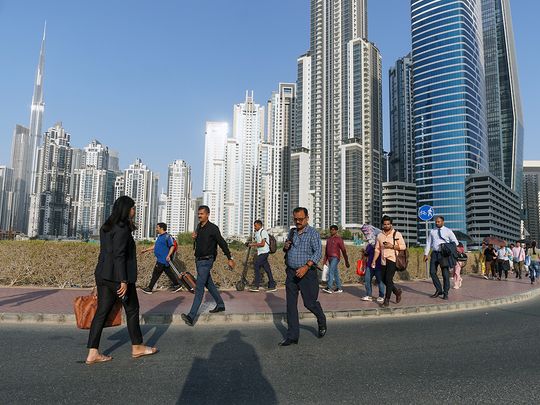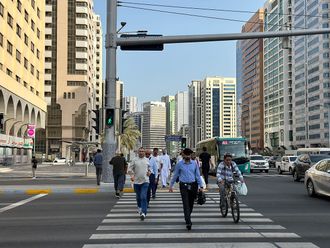
Dubai: With the start of Ramadan, companies in the UAE are required to reduce work timings for employees by two hours every day. But what happens if a company only applies the reduced work timings for employees who are fasting? A Gulf News reader wrote in with the query.
He said: "My company is based in Dubai and we have been told that only Muslim employees will be getting two hours' reduced work timings, while non-Muslim employees should continue working the regular hours. Is this fair? If not, what can we do to request for reduced working hours?"
Gulf News raised the query with legal experts, who spoke about the article in the UAE Labour Law, which mentions the legal provision.
According to Dr Hassan Elhais, legal consultant at Dubai-based Awatif Mohammad Shoqi Advocates and Legal Consultancy, who said that as per Article 15/2 of the Cabinet Decision No. 1/2022 on the Implementing Regulation of Federal Decree-Law No. 33/2021 Regarding the Regulation of Employment Relationships the regular working hours shall be reduced by two hours during the month of Ramadan.
also read
- Failed your Dubai driving test? Here’s how you can appeal the road test results
- Stop unwanted promotional messages on your phone, with TDRA's guide for UAE residents
- Transferring schools in Dubai? Your guide to obtaining a KHDA certificate
- Dubai work permits and visas in five days! New ‘Work Bundle’ streamlines hiring – here’s how
“The text of the law does not specify that such reduction in the usual working hours shall only be limited to Muslim employees. So, the working day shall be reduced for all employees regardless of their religion or whether or not they are fasting, so long as they are subject to the provisions of the aforesaid UAE Labour Law. Any deviation from this regulation may be treated as a violation of the law,” he said.

The text of the law does not specify that such reduction in the usual working hours shall only be limited to Muslim employees. So, the working day shall be reduced for all employees regardless of their religion or whether or not they are fasting, so long as they are subject to the provisions of the aforesaid UAE Labour Law.
Different jurisdiction
The provisions of the UAE Labour Law are applicable to all mainland companies. A mainland company is one which is registered under the government authority of an emirate and licensed by the emirate’s department of economic development.
On the other hand, if a company is registered with a special economic zone, like a free zone, it may be subject to a slightly different jurisdiction. Dr Elhais spoke about how companies operating within the Dubai International Financial Centre (DIFC), for example, were subject to the provisions of the DIFC Law No. 2/2019 (DIFC Employment Law).
DIFC
“Under Article 23, the DIFC Employment Law states that during the month of Ramadan, a Muslim employee shall not be required to work in excess of six hours each day. The DIFC Employment Law specifically makes reference to Muslims in its application of reduced working hours and therefore the working day of non-Muslims shall not be affected,” Dr Elhais said.
ADGM
Similarly, the Abu Dhabi Global Market (ADGM) mentions reduced working hours during the month of Ramadan in Article 18 of the ADGM Employment Regulation 2019.
“Similar to the DIFC Labour Law, the ADGM Employment Regulation provides that a Muslim employee observing a fast shall be entitled to reduction of two working hours. At the same time, the regulation states that there shall be no reduction in the salary for the reason of reduced work hours,” Hari Wadhwana, Associate at Dubai-based law firm OGH Legal, told Gulf News.

Similar to the DIFC Labour Law, the ADGM Employment Regulation provides that a Muslim employee observing a fast shall be entitled to reduction of two working hours. At the same time, the regulation states that there shall be no reduction in the salary for the reason of reduced work hours
So, if you work in a company operating within a free zone, it is important to look at what the labour regulations state regarding working hours during Ramadan. While some free zones may have slightly different work hour requirements, others may mention rules that are similar to the UAE Labour Law.
DMCC
“Dubai Multi Commodities Centre (DMCC) Labour Regulations have specifically laid out Ramadan guidelines, which state that all DMCC companies shall comply with the Federal Labour Law i.e. reduction of two working hours for all employees, irrespective of their religion. Therefore, the Ramadan timings for DMCC companies shall be the same as followed by mainland companies,” Wadhwana said.
Jebel Ali Free Zone
Similarly, Article 11.2.5 of the Jebel Ali Free Zone Rules 2020, state that working hours during Ramadan are reduced to six hours irrespective of the religion of the employee, similar to regulations of the Federal Labour Law.
“The JAFZA rules go further and state that in case an employee works beyond the six hours, it would be considered as overtime and paid accordingly,” Wadhwana said.
How can I raise a complaint if my company violates these laws?
In case your employer is not implementing the reduction in work hours based on the applicable law, what is the best course of action?
While employees are entitled to register a complaint with the Ministry of Human Resources and Emiratisation (MOHRE) or the relevant free zone authority, it is always advisable to first discuss the issue with the concerned person or department at your company.
“The first and foremost option is to open a dialogue with the reporting manager or the human resources (HR) department, on the work timings and attempting to reason it out based on the government mandate,” Wadhwana said.
“The employee can enlighten his or her superiors about the legal provisions and how the company can face sanction if they continue to contravene the relevant labour law or regulation,” he added.
Wadhwana also said that in case an employee wishes to apply for financial compensation for working for longer hours, a written communication from the employer may be necessary.
“Employees must attempt to get it in writing from their reporting manager or HR that the said company would not be following the reduced working hours. This could act as proof that the employee received instructions to work for long hours and was not working voluntarily. Employees could use this email or letter towards a claim of compensation,” he said.
Can I raise a complaint anonymously?
Depending on the economic zone your company is operating under, there may be provisions to raise a complaint anonymously. Additionally, certain free zones conduct routine checks on the companies, and can impose penalties if companies are found violating the regulations on reduced working hours.
“Depending on the free zone, complaints can be raised anonymously, but there would be some record of the complaint being filed. However, MOHRE does not have a feature of filing a complaint anonymously. Hence, the employee will have to formally come on record to complain about the long working hours,” Wadhwana said.
This story was first published on April 13, 2021, and has been updated since.










